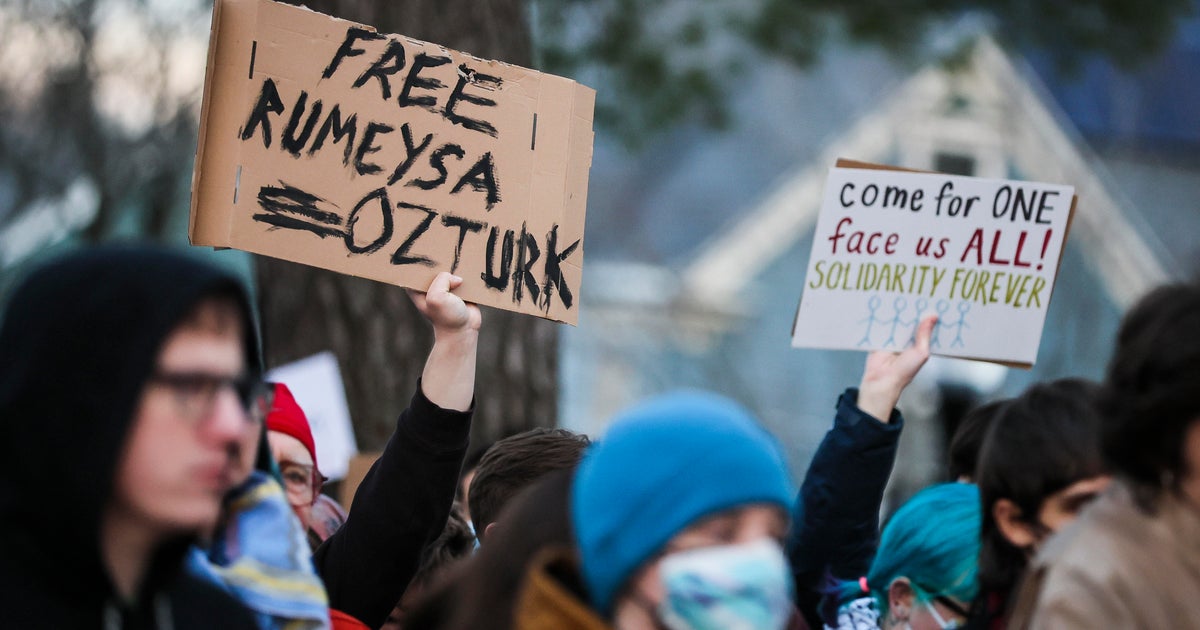Washington — A federal appeals court on Wednesday ordered the Trump administration to comply with a lower court order that requires it to transfer Tufts Ph.D. student Rumeysa Ozturk from a detention facility in Louisiana to Vermont.
The three-judge panel on the U.S. Court of Appeals for the 2nd Circuit rejected a bid for emergency relief sought by the Trump administration in Ozturk’s challenge to her detention. The decision came after the 2nd Circuit panel heard arguments Tuesday on the Justice Department’s request for it to pause a district court’s order that required Ozturk to be transferred to Immigration and Customs Enforcement custody in Vermont.
Ozturk is currently detained at an immigration facility in Basile, Louisiana. A bail hearing in her challenge to her confinement is set to take place at the federal district court in Vermont on Friday. The judges on the 2nd Circuit said the Trump administration has one week — until May 14 — to comply with the district court’s transfer order.
“Permitting Ozturk’s transfer will provide her ready access to legal and medical services, address concerns about the conditions of her confinement, and expedite resolution of this matter — all of which are required, as the court below noted, to proceed expeditiously,” Judges Barrington Parker, Susan Carney and Alison Nathan said in their unanimous opinion. “At stake, too, is Ozturk’s ability to participate meaningfully in her habeas proceedings.”
In response to the decision, Esha Bhandari, a lawyer with the American Civil Liberties Union who argued on behalf of Ozturk during Tuesday’s proceedings, said she and her client are grateful for the court’s decision.
“No one should be arrested and locked up for their political views,” she said in a statement. “Every day that Rumeysa Ozturk remains in detention is a day too long.”
Ozturk, a 30-year-old doctoral candidate at Tufts, was taken into custody by plainclothes ICE agents near her home in Somerville, Massachusetts, on March 25 after the Trump administration revoked her student visa. She was not notified of the revocation beforehand, according to court documents.
As justification for her arrest and detention, the Department of Homeland Security and ICE have said that Ozturk “had been involved in associations that ‘may undermine U.S. foreign policy by creating a hostile environment for Jewish students and indicating support for a designated terrorist organization,'” court filings show.
In 2024, Ozturk had co-authored an opinion piece in the Tufts’ student newspaper that criticized the school for its dismissal of several resolutions adopted by the undergraduate student senate as a “sincere effort to hold Israel accountable for clear violations of international law.” The op-ed did not mention Hamas.
Ozturk is one of hundreds of students studying at American universities who have had their visas rescinded after they were accused of expressing support for Palestinians or participating in campus protests.
After she was arrested, Ozturk was transported to Methuen, Massachusetts, then Lebanon, New Hampshire, followed by St. Albans, Vermont, where she was kept overnight. On the morning of March 26, in Burlington, Vermont, Ozturk was put on a plane and flown to Louisiana, where she is currently in custody at an immigration facility in Basile.
Ozturk’s lawyers filed a petition challenging her arrest and detention as a violation of the First and Fifth Amendments in federal district court in Massachusetts. But the case was transferred to the U.S. district court in Vermont after it was determined that Ozturk was detained in that state at the time the petition was filed.
The Justice Department sought to dismiss Ozturk’s petition, claiming the district court in Vermont lacks jurisdiction since Ozturk is confined in Louisiana. But Ozturk’s lawyers asked U.S. District Judge William Sessions to order her to be released or transferred to Vermont while her claims are adjudicated. Sessions last month ruled that Ozturk had to be transferred to ICE custody in Vermont by May 1. He also set a bail hearing for May 9, with Ozturk appearing in person, and will consider the merits of her habeas petition on May 22.
The 2nd Circuit then temporarily halted Sessions’ order while it considered the Trump administration’s emergency appeal.
The judges said that Ozturk’s constitutional challenge to her detention can move forward, even amid a potential challenge to deportation from the U.S., which would arise after an order of removal has been entered by an immigration judge and affirmed by the Board of Immigration Appeals.
“She asserts that the government arrested and detained her to prevent speech with which it disagrees. Such an act would be a violation of the Constitution — quite separate from the removal procedures followed by the immigration courts,” they wrote.
The panel noted that Ozturk is not seeking to disrupt removal proceedings and said she can attend any hearings before an immigration judge remotely from Vermont.
The judges also highlighted the timeline of the government’s actions moving Ozturk from Massachusetts, where she was arrested, to Louisiana. A federal district judge in Massachusetts had blocked the government from moving Ozturk outside of the state without first providing advance notice, and issued that directive without an hour of the petition challenging her detention being filed.
“Although not technically non-compliant, despite this order, the government moved Ozturk from Vermont to Louisiana the next morning,” the 2nd Circuit panel said.
The appeals court considered Ozturk’s case alongside that of another international student, Mohsen Mahdawi, a Palestinian student at Columbia University. Mahdawi, a green card holder who was born in the West Bank, was detained by immigration agents in Vermont last month during what he was told was a citizenship interview.
But U.S. District Judge Geoffrey Crawford ordered Mahdawi‘s release from immigration custody while a challenge to his detention proceeds. The Trump administration appealed that decision and asked the 2nd Circuit to pause the ruling, which would allow immigration authorities to re-detain him.
The panel has not yet ruled on the Justice Department’s request for emergency relief in Mahdawi’s case.

